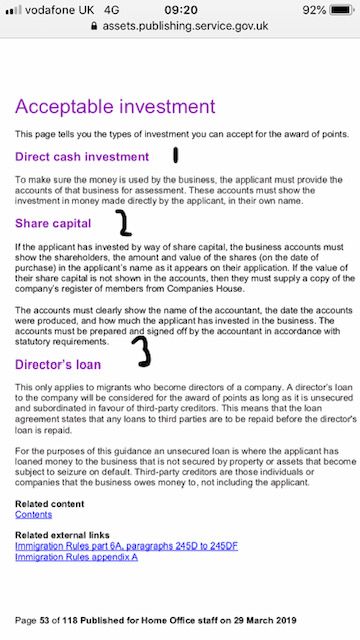
Methods of investment: important guidance for entrepreneurs


One of the requirements for Tier 1 (Entrepreneur) migrants extending their visas in the UK is to show they have invested £200,000 that they previously showed was available for investment in their initial applications.
The important case of R (Sajjad) v SSHD [[2019] EWCA Civ 720](https://www.bailii.org/ew/cases/EWCA/Civ/2019/720.html) is about the ways in which entrepreneur migrants can do this.
It is a textbook example of the lack of flexibility and confusion inherent in the Points Based System, and required reading for migrants in this route considering how to invest their funds.
What is a permissible investment?
Essentially, the Secretary of State argues in this case that there are only two ways to raise funds: (i) debt, via a director's loan and (ii) equity, via an issue of shares.
In the case of Sajjad, the lawyer for the Home Office is recorded as arguing that the effect of the relevant immigration rules
is that a [Tier 1 (Entrepreneur)], who seeks an award of points on the basis of an investment in a UK business, must establish that the investment has taken one of only two permissible forms: investment by way of a director's loan, or investment by way of purchase of share capital
This is pretty concerning, given that the guidance states pretty clearly a third way, of 'direct cash investment' (see (1), below):

Whilst not making a final ruling on the question of investment via 'gift' or direct cash investment (the point was not directly relevant to the outcome of the case), the court held that
I can see no reason why the [Home Office] should be taken to have intended that strict requirements must be observed as to the documents to be provided as evidence of two particular forms of investment, but that other forms of investment will qualify for an equal award of points without any evidential requirements beyond an entry in the company's accounts.
(As set out above, the 'strict requirements' referred to are, for director loans, (i) a director's loan agreement which meets four basic requirements (ii) entry into the company accounts and (iii) bank statements showing the loan passing from individual to the company; and for share capital the entry into the company accounts must show (i) list of shareholders (ii) amount and value of the shares at time of purchase. All that is required for 'direct cash investment' is entry into the accounts.)
These two methods of investment might make sense for directors of companies, but what about Tier 1 (Entrepreneurs) who are self-employed, and for whom directors' loans or share equity are not an option?
There is no distinction drawn in the rules between the evidence required for Tier 1 (Entrepreneurs) who are company directors as against those who are self employed, and which one might expect to see on the basis of the reasoning given in Sajjad.
What to do?
The decision in Sajjad is a concerning development, and may cause serious issues for individuals who had previously believed that they could simply gift funds to their business, and record this in the accounts.
If you are concerned about how to invest your funds in a way which is compliant with the Tier 1 (Entrepreneur) rules, feel free to get in touch and arrange a one-off consultation or check out our Tier 1 (Entrepreneur) service.
You can read further analysis of this case on Free Movement.
Main image credit: Photo by Ibrahim Rifath on Unsplash